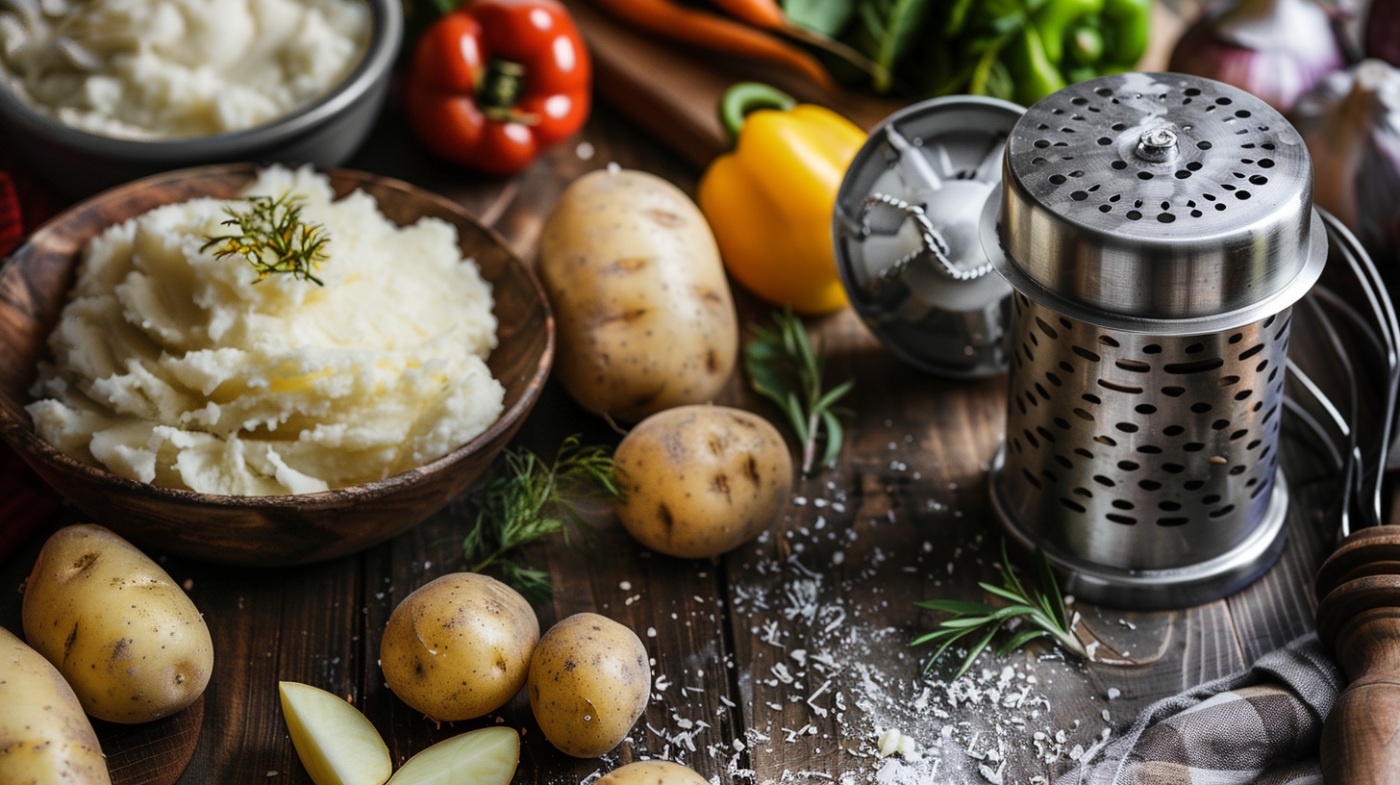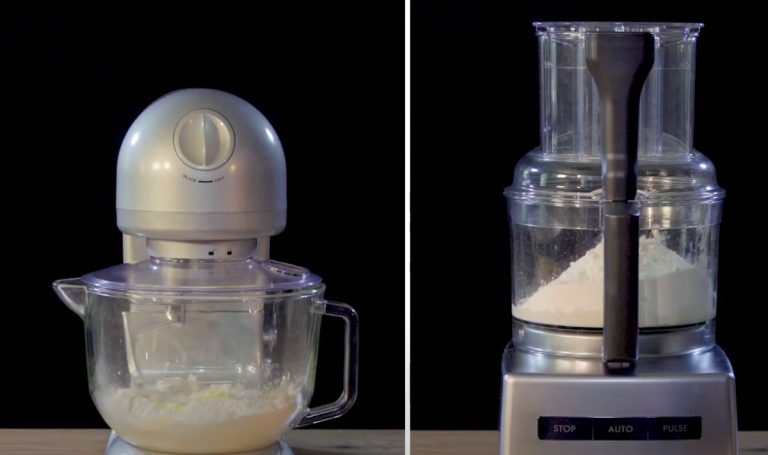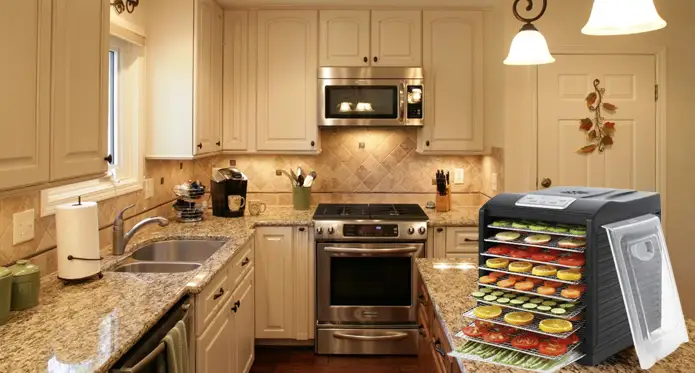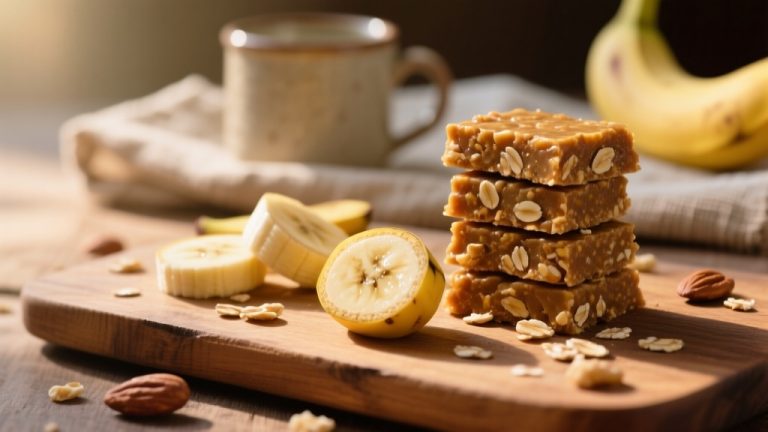Potato Ricer vs. Food Mill: Know Which Tool Reigns Supreme
When you’re choosing between a potato ricer and a food mill, think about what you need. A potato ricer makes smooth, fluffy mashed potatoes, designed specifically for potatoes, and it’s compact for easy storage.
On the other hand, a food mill is versatile, perfect for pureeing and straining various fruits and vegetables into sauces, but it requires more space and effort to clean. If you’re mainly mashing potatoes, go for the ricer. If you’re processing larger batches of different ingredients, the food mill is your tool.
There’s more to explore about these handy tools and their unique uses.
Key Takeaways
- A potato ricer excels at producing light, fluffy mashed potatoes with minimal starch release, which is ideal for frequent use in simple preparations.
- A food mill offers versatility, processing various fruits and vegetables, making it suitable for sauces and purees in larger quantities.
- Potato ricers are compact and budget-friendly, making them perfect for kitchens with limited storage space and those on a budget.
- Food mills have a bulkier design and require more effort for cleaning and assembly, which may impact kitchen efficiency.
- Choose a potato ricer for simplicity and ease, while a food mill is better for those seeking multifunctionality and finer textures.
The Basics of Potato Ricer and Food Mill Tools
When you’re in the kitchen, choosing the right tool can make all the difference in your cooking experience. The potato ricer and food mill are two essential gadgets that can elevate your culinary creations.
If you’re aiming for smooth mashed potatoes, the potato ricer operates like a garlic press, effortlessly transforming cooked potatoes into light and fluffy mounds. Its compact and lightweight design makes it a breeze to handle and store, perfect for whipping up creamy gnocchi or side dishes.
On the other hand, the food mill is a versatile powerhouse, combining puréeing and straining functions. With a hand crank and interchangeable plates, it processes a wide range of fruits and vegetables into smooth sauces and purées.
Whether you’re making fresh tomato sauce or apple sauce, this tool excels in delivering a finer texture by removing unwanted fibers and seeds. While the potato ricer is tailored for potatoes, the food mill opens the door to various culinary possibilities.
Advantages of Potato Ricer and Food Mill
Which tool should you choose for your kitchen needs? The potato ricer and food mill each have unique advantages that cater to different culinary tasks.
If you love making fluffy, smooth mashed potatoes, the potato ricer is your go-to tool. It ruptures potato cells in just one pass, minimizing starch release and preventing that pesky gumminess you sometimes get with other methods. Plus, it’s generally more affordable and easier to clean, making it perfect for everyday use.
On the other hand, the food mill shines in versatility. It’s ideal for processing a wide range of fruits and vegetables, allowing you to create sauces and purées while effortlessly straining out seeds and fibers for a finer texture. Its larger capacity means you can prepare large batches efficiently, which is perfect for gatherings or meal prep.
However, keep in mind that food mills can be bulkier and require more effort to maintain. Ultimately, whether you opt for the potato ricer or the food mill depends on what you’re cooking and your kitchen demands. Both tools can elevate your culinary experience in their own right.
Disadvantages of Each Tool
While both the potato ricer and food mill offer distinct advantages, they also come with their own set of disadvantages that can impact your cooking experience.
The potato ricer, for instance, is limited in its versatility. It’s primarily designed for potatoes, which means it struggles with tougher vegetables, making it a bit of a unitasker. If you’re preparing larger quantities, you’ll find its small hopper capacity a hassle, as it can only process one potato at a time, slowing you down considerably.
On the other hand, the food mill, while more versatile in handling various fruits and vegetables, has its own drawbacks. Its bulky design often demands more storage space in your kitchen, which can be a concern in tighter areas.
Additionally, the complexity of assembly with interchangeable plates can be intimidating for some. Don’t forget about cleaning. It’s best to wash it immediately after use to avoid pesky residue buildup, which can make this task even more time-consuming.
Top Considerations When Buying Potato Ricers and Food Mills
When you’re choosing between a potato ricer and a food mill, think about how often you’ll use each tool. If you’re short on kitchen space, a compact ricer might be your best bet, while a food mill is better for larger batches but takes up more room.
Don’t forget to factor in your budget, as ricers are usually easier on the wallet compared to the more varied pricing of food mills.
Frequency of Use
Frequently evaluating how often you cook can greatly influence your choice between a potato ricer and a food mill. If you find yourself whipping up mashed potatoes frequently, a potato ricer is your best bet.
Its simple design allows for quick, efficient use, making it ideal for small to medium batches. Plus, it’s easy to clean, fitting perfectly into a minimalist kitchen style.
On the other hand, if you often prepare sauces, soups, or purées from a variety of fruits and vegetables, a food mill could be more beneficial. This versatile tool handles larger quantities with ease, making it perfect for meal prepping for gatherings or family dinners.
However, keep in mind that a food mill comes with more complex cleaning requirements, which can be a hassle if you prefer quick cleanup.
Assess your cooking style and frequency of use before making a decision. A potato ricer is often more affordable and easier to store, while a food mill offers more versatility for those who enjoy cooking in larger quantities. Your choice should reflect how you like to cook and how often you plan on using these tools.
Storage Space Needs
Storage space is an essential factor to take into account when deciding between a potato ricer and a food mill. If you have limited kitchen space or prefer to keep your countertops clutter-free, a potato ricer is a fantastic choice. Its compact size allows you to easily tuck it away in drawers or cabinets without taking up valuable room.
On the other hand, a food mill features a bulkier design, complete with a hand crank and multiple parts that require more substantial storage solutions. This can be a challenge if your kitchen layout is tight or your cabinets are already full. Finding a place for a food mill might mean sacrificing shelf space or organizing your kitchen more elaborately.
When reviewing your options, think about how frequently you cook and the tools you currently own. If space is at a premium, the potato ricer’s efficiency and compactness can make it the better option.
Budget Considerations
Choosing the right kitchen tool often comes down to budget considerations, especially if you’re mindful of your spending. When weighing potato ricers against food mills, it’s clear that cost plays a significant role in your decision.
- Potato ricers range from $20 to $40, making them a budget-friendly option for casual cooks focused on mashed potatoes.
- Food mills start around $30 but can soar up to $100 or more, depending on the brand and features.
- While food mills may seem pricier, their multi-functional capabilities can justify the investment for serious home chefs who prepare a variety of dishes.
- If you primarily mash potatoes, a potato ricer offers simplicity and affordability, tailored to your needs.
- However, if you’re looking to expand your culinary repertoire, a food mill might be worth the splurge.
Frequently Asked Questions
Is a Ricer Better Than a Food Mill for Potatoes?
When you’re after lighter, fluffier mashed potatoes, a ricer’s your best bet. It efficiently ruptures potato cells, minimizing starch release, while a food mill can create a creamier texture but may introduce excess moisture.
Can I Use a Potato Ricer Instead of a Food Mill for Tomatoes?
You can’t use a potato ricer for tomatoes. It’ll mush them up instead of providing a smooth sauce. A food mill efficiently separates seeds and skins, ensuring your tomato dish has the perfect texture.
Does a Potato Ricer Make Better Mashed Potatoes?
Ever wondered how to achieve the perfect mashed potatoes? A potato ricer’s design guarantees light, fluffy texture by minimizing starch release, making your mashed potatoes smoother and more flavorful than using traditional methods. You’ll love the results!
Can You Put Potatoes in a Food Mill?
Yes, you can absolutely put potatoes in a food mill! Cooking them until tender makes processing easier, yielding a creamy texture while removing skins effortlessly. Just be prepared for a bit more cleanup afterward!
Blend the Best: Experiment with Both Tools for Unmatched Culinary Creativity
In the battle of potato ricers versus food mills, choosing the right tool really depends on your cooking style. While some swear by the velvety smoothness of a ricer, others lean towards the versatility of a food mill.
But here’s a thought: could it be that the best results come from using both? Experimenting with each might reveal unique textures and flavors you never knew existed. So, why not give them both a try and elevate your culinary creations?







